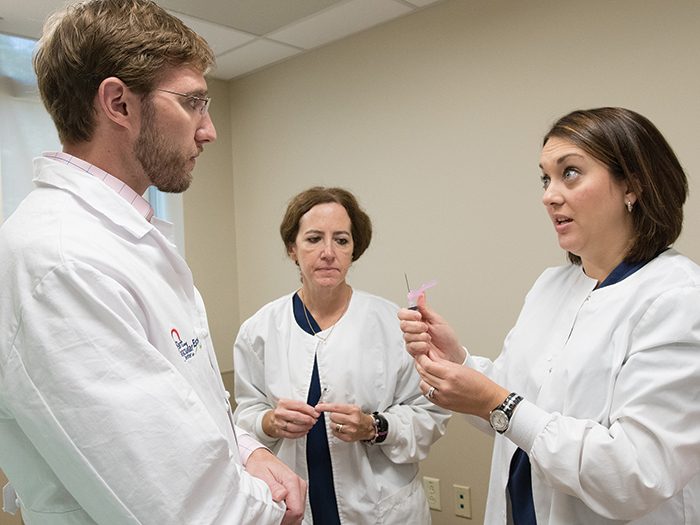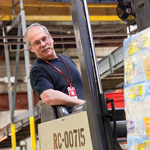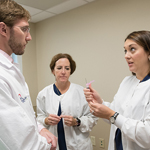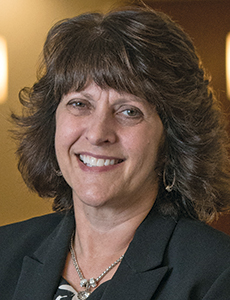2016 Teddy Award Winner
Improve the Well-Being of Every Life

Excela Health, a health care network operating three hospitals in western Pennsylvania, abides by its mission to improve the health and well-being of every life it touches.
“When we wrote that mission statement about 10 years ago, ‘every life we touched’ was supposed to encompass not only our patients, but our employees and everyone who is here,” said Chief Medical Officer Carol Fox.
Taking extra care of its employees comes with an added bonus — it helped Excela deeply reduce workers’ compensation claims in the process.
Excela’s across-the-board efforts earn the hospital a 2016 Teddy Award. The numbers speak for themselves: Excela lowered workers’ compensation paid claims costs to $124,076 last year from $859,515 in 2008.
The hospital managed injured employees with a creative and robust return-to-work program and added around-the-clock support from an on-call nursing team. Then it bolstered employee wellness programs and attacked the top causes of workplace injury.

Carol Fox, chief medical officer, Excela Health
Excela was formed in 2004 with the merger of three regional Pennsylvania hospitals: Frick Hospital in Mount Pleasant; Latrobe Hospital in Latrobe; and Westmoreland Hospital in Greensburg. The combined health system is the largest employer in the region with more than 4,500 employees.
Excela also runs a home health care and hospice company with 206 workers making more than 275 home visits each day. And there’s a physician practice that employs another 900 people in 98 locations.
That’s a lot of opportunity for accidents and yet just 62 employees filed an OSHA recordable claim in the fiscal year ending June 30, 2016, down from 233 in fiscal year 2008.
Return to Work Program
A big part of Excela’s efforts is its Temporary Transitional Return to Work Program, launched in 2010 to encourage employees to remain productive after a work-related injury or illness.
“We keep them working and keep them engaged and we care about them,” said Laurie English, Excela’s chief human resource officer.
Excela has been able to put about 95 percent of injured workers in this program. “That’s truly where the cost reduction has happened,” English said.
Take for example cardiac nurse Ruth Ann Martin. She snagged her foot on a computer cord while getting up to answer a patient’s call a few years ago. She tumbled and her kneecap — taking the brunt of the fall — shattered.
After four decades of working at the hospital without so much as a scratch, the injury sidelined her for a month. After she fell, Martin was met in the emergency room by Eileen Kantorik, an occupational health coordinator, who opened a worker’s compensation case for her.
“We keep them working and keep them engaged and we care about them.” — Laurie English, chief human resource officer, Excela Health
Kantorik has stayed by Martin’s side ever since. She found Martin transportation back and forth to the hospital once she was cleared to return to work. She arranged assistance for Martin, who initially needed a walker, to her desk once she arrived. Kantorik checked in on Martin throughout her recovery and was accessible by cell phone after-hours.
“It made me feel better,” Martin said. “They walked me through everything. It helped a lot because you have the fear of the unknown and without that support it would have been a lot harder.”
As she recovered, Martin was approved to perform scaled-back jobs at the same rate of pay. She has since fully recovered and returned to her previous nursing job. Excela recently celebrated her 45th anniversary at the hospital.
“Where there is an unsafe working condition we feel we owe it to our employees to get them back to 100 percent as quickly as possible,” English said.
“We found having the employee in their department, with the people around them that they normally socialize with, helped to keep them engaged and back to full duty quicker.”
Nurse on Call Program
A Nurse on Call program is another new way Excela captured big cost savings by directing employees to its Employee Health department immediately after an injury. Certified occupational health coordinators such as Kantorik advise employees with significant injuries how best to navigate the workers’ compensation process.
This approach gets employees the most appropriate and cost-effective treatment. If an employee’s injury happens after business hours, or on a weekend or holiday, a Nurse on Call (NOC) initiates the process.
In the past, since Excela runs hospitals, its injured employees instinctively walked to the emergency department for treatment, adding unnecessary expense to the claim.
Excela changed that behavior and got staff comfortable with working with an employee health coordinator using best workers’ comp practices.
Employee Health gets employees seen by the appropriate medical specialist and then back on the job, at full pay, as quickly as possible.
This helps the employee avoid using unnecessary vacation or sick time off, said Mary Blackburn, supervisor of employee safety.
“People who have been injured at work have come to really appreciate that program because they have somebody that’s watching after them and ensuring that things are happening the way things are supposed to be happening,” Fox said.
Tackling the Top Hazards
Excela didn’t just improve the way they cared for employees after an injury. They also established a team that would spring to action to study what caused the accident and how to prevent it in the future.
“We are looking at keeping injuries from ever happening,” said David Byers, director of support services and safety.
“If we can keep that from happening in the first place, we don’t have the injury and we don’t have any of the costs to go along with it.”
After Ruth Ann Martin, the nurse, tripped on the extension cord and busted her knee, Excela’s safety team tied up every cord at every work station off the floor throughout the entire health network. They even redesigned all conference rooms to eliminate cord clutter.
Of all the risks, Excela’s research initially ranked exposure to blood and body fluids (BBFs) as the No. 1 occupational hazard — that’s needle sticks and other sharp-related injuries which can potentially expose workers to blood borne pathogens such as hepatitis or HIV.
In one case, a phlebotomist was in the middle of the blood draw when a nurse quickly entered the room. The phlebotomist flinched, causing the needle to dislodge and stick her.
When the safety team studied the event, they realized there was no mechanism in place to alert staff when a blood draw is under way.
They set to work to create a broad solution with a program called “Get the Point.” It involves staff training and a hospital-wide flag system on all patient rooms with colored signage indicating the safety hazards within.
What’s on Your Feet?
When digging into other top injuries, Excela discovered employees were getting hurt on their way to and from work. Falls and fractures spiked during inclement weather.
The Safety and Occupational Health Department launched “What’s On Your Feet?” They greeted arriving employees with safety materials and LifeSavers candy at the entrances as a fun way to encourage appropriate footwear. It worked. Entering work became a red carpet moment as employees playfully showed off shoes to safety advocates each morning.
It all falls under their mission to improve the health and well-being of every life Excela touches.
“That’s the Holy Grail,” Fox said. “We want everybody to be at least as good, and hopefully better, when they leave here.” &
_______________________________________________________
Read more about the 2016 Teddy Award winners:
 Bringing Focus to Broad Challenges: Target brings home a 2016 Teddy Award for serving as an advocate for its workers, pre- and post-injury, across each of its many operations.
Bringing Focus to Broad Challenges: Target brings home a 2016 Teddy Award for serving as an advocate for its workers, pre- and post-injury, across each of its many operations.
 The Road to Success: Accountability and collaboration turned Hampton Roads Transit’s legacy workers’ compensation program into a triumph.
The Road to Success: Accountability and collaboration turned Hampton Roads Transit’s legacy workers’ compensation program into a triumph.
 Improve the Well-Being of Every Life: Excela Health changed the way it treated injuries and took a proactive approach to safety, drastically reducing workers’ comp claims and costs.
Improve the Well-Being of Every Life: Excela Health changed the way it treated injuries and took a proactive approach to safety, drastically reducing workers’ comp claims and costs.
 The Family That’s Safe Together: An unwavering commitment to zero lost time is just one way that Harder Mechanical Contractors protects the lives and livelihoods of its workers.
The Family That’s Safe Together: An unwavering commitment to zero lost time is just one way that Harder Mechanical Contractors protects the lives and livelihoods of its workers.
More coverage of the 2016 Teddy Awards:
Recognizing Excellence: The judges of the 2016 Teddy Awards reflect on what they learned, and on the value of awards programs in the workers’ comp space.
Fit for Duty: 2013 Teddy Winner Miami-Dade County Public Schools is managing comorbid risk factors by getting employees excited about healthy living.
Saving Time and Money: Applying Lean Six Sigma to its workers’ comp processes earned Atlantic Health a Teddy Award Honorable Mention.
Caring for the Caregivers: Adventist Health Central Valley Network is achieving stellar results by targeting its toughest challenges.
Advocating for Injured Workers: By helping employees navigate through the workers’ comp system, Cottage Health decreased lost work days by 80 percent.
A Matter of Trust: St. Luke’s workers’ comp program is built upon relationships and a commitment to care for those who care for patients.
Keeping the Results Flowing: R&I recognizes the Metropolitan Water Reclamation District of Greater Chicago for a commonsense approach that’s netting continuous improvement.











